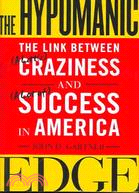| FindBook |
有 1 項符合
The Hypomanic Edge: The Link Between (a Little) Craziness and (a Lot of) Success in America的圖書 |
 |
The Hypomanic Edge: The Link Between (a Little) Craziness and (a Lot of) Success in America 作者:John D. Gartner 出版社:Simon & Schuster 出版日期:2005-03-01 |
| 圖書館借閱 |
| 國家圖書館 | 全國圖書書目資訊網 | 國立公共資訊圖書館 | 電子書服務平台 | MetaCat 跨館整合查詢 |
| 臺北市立圖書館 | 新北市立圖書館 | 基隆市公共圖書館 | 桃園市立圖書館 | 新竹縣公共圖書館 |
| 苗栗縣立圖書館 | 臺中市立圖書館 | 彰化縣公共圖書館 | 南投縣文化局 | 雲林縣公共圖書館 |
| 嘉義縣圖書館 | 臺南市立圖書館 | 高雄市立圖書館 | 屏東縣公共圖書館 | 宜蘭縣公共圖書館 |
| 花蓮縣文化局 | 臺東縣文化處 |
|
|
- 圖書簡介
Why is America so rich and powerful? The answer lies in our genes, according to psychologist John Gartner.
Hypomania, a genetically based mild form of mania, endows many of us with unusual energy, creativity, enthusiasm, and a propensity for taking risks. America has an extraordinarily high number of hypomanics -- grandiose types who leap on every wacky idea that occurs to them, utterly convinced it will change the world. Market bubbles and ill-considered messianic crusades can be the downside. But there is an enormous upside in terms of spectacular entrepreneurial zeal, drive for innovation, and material success. Americans may have a lot of crazy ideas, but some of them lead to brilliant inventions.
Why is America so hypomanic? It is populated primarily by immigrants. This self-selection process is the boldest natural experiment ever conducted. Those who had the will, optimism, and daring to take the leap into the unknown have passed those traits on to their descendants.
Bringing his audacious and persuasive thesis to life, Gartner offers case histories of some famous Americans who represent this phenomenon of hypomania. These are the real stories you never learned in school about some of those men who made America: Columbus, who discovered the continent, thought he was the messiah. John Winthrop, who settled and defined it, believed Americans were God's new chosen people. Alexander Hamilton, the indispensable founder who envisioned America's economic future, self-destructed because of pride and impulsive behavior. Andrew Carnegie, who began America's industrial revolution, was sure that he was destined personally to speed up human evolution and bring world peace. The Mayer and Selznick families helped create the peculiarly American art form of the Hollywood film, but familial bipolar disorders led to the fall of their empires. Craig Venter decoded the human genome, yet his arrogance made him despised by most of his scientific colleagues, even as he spurred them on to make great discoveries.
While these men are extraordinary examples, Gartner argues that many Americans have inherited the genes that have made them the most successful citizens in the world.
|











